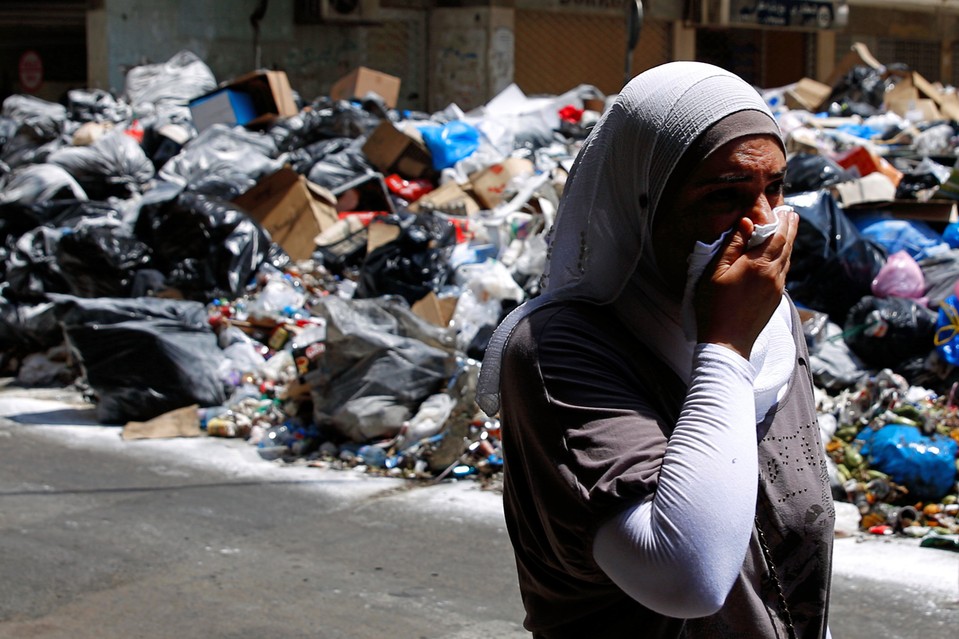
BEIRUT—Lebanon’s congested capital has a new scourge—mounds of trash simmering under a hot summer sun after protests thwarted garbage collection for more than a week.
The protests, stemming from a dispute over a landfill, have everyone from mayors to priests taking matters into their own hands. They are launching recycling campaigns and trash pickups as well as accusations at a government seen as paralyzed and ineffective.
“We have to solve all our problems ourselves—water problems, electricity problems, wastewater and now solid waste,” said Gibran Safi, the mayor of Arsoun, a small town of 400 people in Mount Lebanon governate, which has also been affected by the protests.
“We are forced, as citizens, to solve them because as a government, there is nothing being done even though all solutions are there and they can provide revenue” to the government, he added.
The trash dispute began on July 17 in the coastal town of Naameh, south of Beirut, the site of Lebanon’s largest landfill. Residents there refused to allow garbage trucks to dump their waste, protesting against the government’s inability to find an alternative landfill site.
Plants for sorting trash operated by Sukleen, a private firm contracted by the government to collect garbage, reached full capacity with the landfill closed. With no alternative dump site, garbage collection in two governorates, Beirut and Mount Lebanon, came to a near standstill.
Lebanon’s environment ministry declined to comment. But earlier this week, Environment Minister Mohammed el-Mashnouq posted a statement saying his office was “working silently” to ease the burden of what he called a tragic situation.
With Lebanon’s presidency vacant for more than a year now, a war in neighboring Syria that sporadically spills across the border, and a growing refugee crisis as a result of that war, nobody is counting on the already struggling Lebanese government finding a solution soon.
The Beirut municipality allotted a piece of land to Sukleen on Wednesday and the company’s trucks cleared many of the garbage piles from the streets of Beirut on Thursday. But it is a temporary arrangement that will only last for 10 days, said Beirut Mayor Bilal Hamad.
Sukleen’s contract expired on July 17, but the company continues its operations.
The crisis has given rise to a number of homegrown solutions.
“We made a schedule that on Mondays, Wednesdays, Fridays and Saturdays, we [municipal workers and volunteers] go around the village to pick up organic, biodegradable garbage,” said Louis Abi Habib, mayor of the northern town of Roumieh. The recyclable material, which accounts for a good chunk of the trash, will be sold to help fund the house collection initiative, he added.
To encourage more participation in their local initiative, priests drew from Pope Francis’ second encyclical released in May, which calls for the reduction of pollution and criticizes the modern-day “throwaway culture”.
Some companies and nongovernmental organizations in Beirut see the crisis as an opportunity.
Uber, the multibillion-dollar transportation company, launched a campaign on Wednesday entitled #UberRECYCLE. Users of the mobile app can request a van to pick up their recyclable materials at no charge.
“We’ve started out with four vans and will be adding to match the demand,” said Uber spokeswoman Shaden Abdellatif. “So far, the response has been incredible,” she added.
The spokeswoman couldn’t say how many calls were made to use the service, or the number of bags picked up thus far.
“I think it is a golden opportunity now to start saying to people that you need a paradigm shift. You need to stop looking at waste as a problem and start looking at it as a resource,” said Ziad Abichaker, owner of an environmental engineering organization.
Mr. Abichaker has already begun brainstorming ways of tackling the garbage crisis himself. Despite Beirut’s narrow streets and congested traffic, he is hoping to bring recycling machines to garbage bins on the ground, rather than the opposite.
“It will be a self-funded” and self-run, Mr. Abichaker said.
Write to Dana Ballout at dana.ballout@wsj.com



